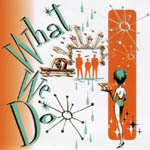Home » Jazz Articles » Album Review » McGill / Manring / Stevens: What We Do
McGill / Manring / Stevens: What We Do
There are times when you just know they're messing with your mind. "Cherokee opens the disc gently enough: a newly-minted intro leads to McGill's gently-chorused tone delivering the familiar theme over Manring and Stevens' capable swing. But when it hits the solo section and McGill's heavily distorted guitar ratchets things up a notch, you know you're not in Kansas anymore. McGill shreds hard over Stevens' funky backbeat on Wayne Shorter's "Footprints, with a drum sound that's more rock than jazz.
It's not all about powerhouse excess. But it is about approaching the material with less reverence than most purists will be able to bear. "Blue in Green retains its gentle veneer but, like John Coltrane's "Naima, is treated as a rubato tone poem. Manring's processed fretless tone is the primary voice on both, while McGill creates a lush backdrop. Scott LaFaro's "Gloria's Step finds McGill on nylon-string guitar, demonstrating an advanced language that will come as a surprise to those who believe that fusion/progressive artists lack roots in the tradition. The tone may be dirty, but McGill's chordal intro to what morphs into an abstract look at Miles Davis' "Solar has clear antecedents.
Manring sets the tone for an imaginative take on Herbie Hancock's "Maiden Voyage. He shifts gears from a rubato opening into a funkified house-style take on Coltrane's "Impressions ; its complexion is as much the result of Torn's mix as the trio's approach. By the time it returns to Hancock's theme, both McGill and Manring's tones are so dense that they bring new meaning to the term "heavy metal bebop. "Icarus is as far from Ralph Towner's uplifting folk anthem as could be imagined, while Wayne Shorter's "Nefertiti gradually moves from acoustic atmospherics to electric saturation and back again.
A bonus disc from a 2001 live performance finds the trio on more familiar turf, helping establish context for the "standards disc. Just because artists choose to eschew conventional jazz doesn't mean they haven't studied it, or that it doesn't infuse what they do. What We Do, then, is an appropriate title for an album that twists its source material in so many unexpected ways that it's essential to approach it with big ears and an open mind. You may never look at standards the same way again.
Visit Scott McGill, Michael Manring and Vic Stevens on the web.
Track Listing
CD1: Cherokee; Footprints; Blue in Green; Solar; Gloria's Step; Icarus; Naima; Invitation; Nefertiti; Bessie's Blues; Maiden Voyage; Oleo. CD2: COnflict Resolution; The Ripe One; Pools; Improv 1; The Voyage of St. Brendan; Improv 2/Drum Solo/In-a-Gadda-DaVinci; Bad Hair Day; Addition by Subtraction.
Personnel
Scott McGill: guitar; Michael Manring: bass; Vic Stevens: drums.
Album information
Title: What We Do | Year Released: 2006 | Record Label: Free Electric Sound
Tags
PREVIOUS / NEXT
Support All About Jazz
 All About Jazz has been a pillar of jazz since 1995, championing it as an art form and, more importantly, supporting the musicians who make it. Our enduring commitment has made "AAJ" one of the most culturally important websites of its kind, read by hundreds of thousands of fans, musicians and industry figures every month.
All About Jazz has been a pillar of jazz since 1995, championing it as an art form and, more importantly, supporting the musicians who make it. Our enduring commitment has made "AAJ" one of the most culturally important websites of its kind, read by hundreds of thousands of fans, musicians and industry figures every month.




















